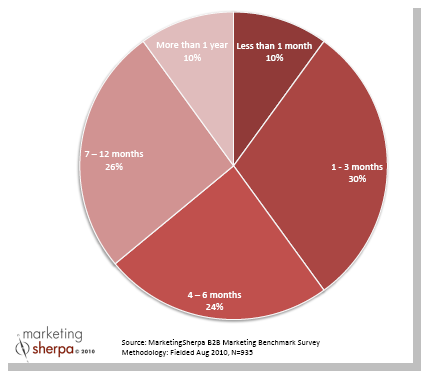B2B Lead Generation Tips Part II
In my last article, we discussed B2B marketing challenges such as the need to generate high quality leads while driving a high volume of leads, and B2B marketers’ increasing focus on post-click website improvements. Today, we’ll continue our market analysis with a look at how B2B search marketers are scoring and tracking leads, interacting with […]
In my last article, we discussed B2B marketing challenges such as the need to generate high quality leads while driving a high volume of leads, and B2B marketers’ increasing focus on post-click website improvements.
Today, we’ll continue our market analysis with a look at how B2B search marketers are scoring and tracking leads, interacting with their sales teams, and dealing with lengthening sales cycles.
B2B Sales Cycles Are Lengthening
When Marketing Sherpa recently asked B2B organizations what marketing challenges are the most pertinent to their organizations, 41% selected a lengthening sales cycle.
The chart below shows B2B marketers’ responses when asked: How long is your sales cycle (from first inquiry to purchase)?
- The vast majority of business marketers (90% of all organizations surveyed) are dealing with a sales cycle in excess of one month.
- 60% report a sales cycle of 4 months or longer, and
- 10% of B2B marketers are managing a purchase process that is greater than 1 year.
In general, sales cycles are longer for marketers working at larger companies than small businesses. Also, not surprisingly, large (higher priced) deals take longer to close than small, lower-priced deals.
Sales Stages Tracked
As purchase times lengthen, B2B search marketers are putting more emphasis on defining and tracking leads through the sales funnel.
It’s no longer sufficient to simply track organic and paid search conversions – marketers are now focusing on what happens after the initial search-generated conversion.
According to Marketing Sherpa, here are the most common 8 stages tracked by B2B firms:
- Online lead (typically defined as: registration form completed)
- Validated lead
- Phone call-ready lead
- Phone-validated lead
- Sales-team-ready
- Sales-team-validated
- Active (i.e. forecasted lead)
- Sale/Customer
In general, larger organizations have a more defined, granular sales funnel – tracking all the steps listed above. Many smaller B2B firms have simpler sales processes and track less overall phases.
Regardless, there is still significant room for improvement, since approximately 22% of all B2B firms surveyed didn’t have a well-defined sales funnel at all.
B2B Lead Scoring
Of course, most B2B search marketers are tracking organic and paid conversions (for example, volume of online registrations and cost/registration).
But now, in addition to this basic analysis, business marketers are looking at lead scoring factors, and tracking these factors over time.
The most common B2B lead scoring factors include:
- # website visits over time
- level of website activity/inactivity
- company size
- budget
- purchase timeframe
This type of ongoing, detailed lead analysis enables B2B firms to be smarter about how to follow-up and nurture potential customers, investing limited sales and marketing resources where most likely to pay off and generate sales.
Integration With Sales
As sales cycles lengthen and as B2B marketers become more sophisticated in tracking lead quality over time… not all search-generated leads are immediately (or ever) passed to the sales team.
Sales and marketing teams are grappling with the question: just how much information is required?
Basic contact information
Many marketers still employ a fairly simple approach when determining which leads to forwarded to sales.
- 80% of B2B marketers polled forward leads to sales as long as the most basic contact info has been collected (for example: first and last name; email address; company).
- Typically, this contact info is collected via a website registration form or a phone call.
Optional, additional lead qualifiers
- 42% B2B marketers only pass leads to sales if the lead has indicated a valid business need
- 28% only pass if the lead has identified themselves as a decision maker
- 25% also analyze scoring factors such as email opens, content downloads, website visits, etc. – before deciding if the lead should be forwarded to sales.
Good News For Search Marketers
In my opinion, all of these market trends are good news for B2B search marketers! Why? As we become more informed about lead quality, we become more capable of demonstrating and improving search marketing ROI.
I urge you to work with your clients’ sales teams, or your internal sales team, to establish a solid search marketing lead-quality feedback loop.
Ask yourself (or your CMO), ultimately, what is more important:
How many searchers “convert” and complete a registration form, or
How many searchers become long-term, valuable customers?
When you let ROI drive your search strategy, you may be surprised… the search marketing program that drives the most registrations (“search leads”) may not be the program the ultimately delivers customers and sales.
Opinions expressed in this article are those of the guest author and not necessarily Search Engine Land. Staff authors are listed here.
Related stories
